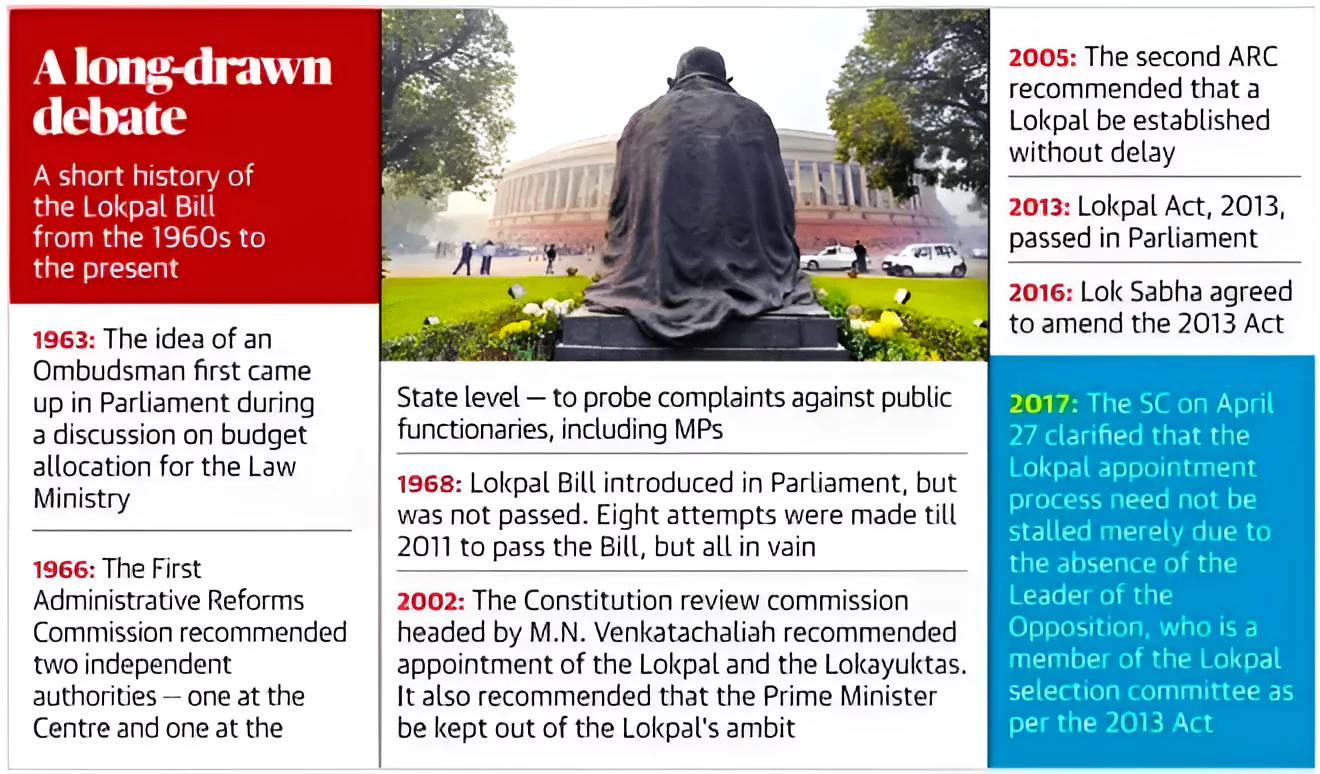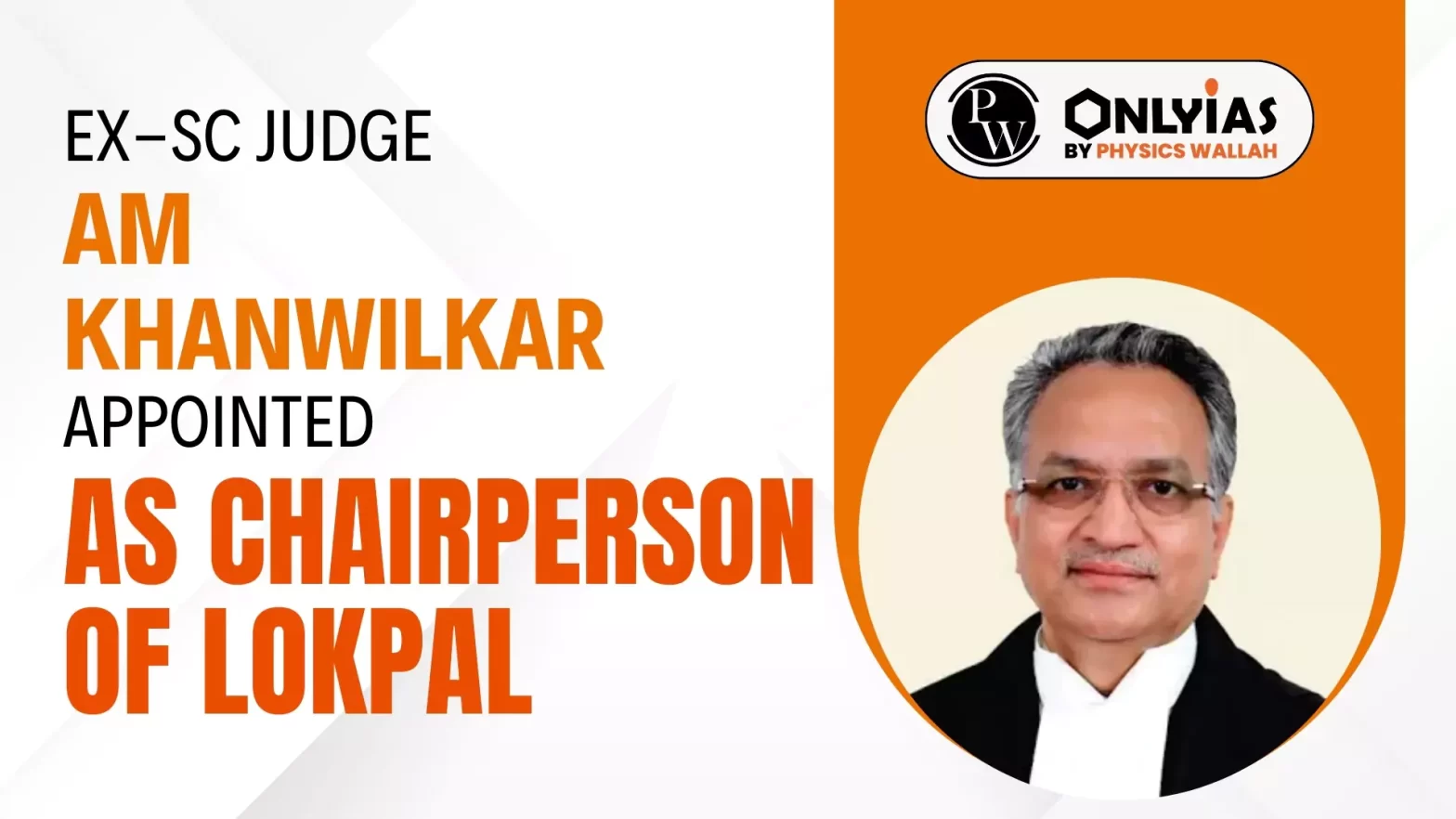Context:
This editorial is based on the news “Former SC judge AM Khanwilkar is new Lokpal chairperson” which was published in the Indian Express. Recently, the President of India appointed former Supreme Court Judge Justice AM Khanwilkar as the Chairperson of Lokpal.
| Relevancy for Prelims: Lokpal And Lokayuktas In India, Corruption Perceptions Index 2023, Supreme Court, Money Laundering, and Enforcement Directorate (ED).
Relevancy for Mains: Lokpal: Compositions, Chairperson, Members, Appointments Procedure, Tenure, Mandate, Powers, Functions, Criticisms and Way Forward. |
President Murmu Appoints Ex-SC Judge Justice AM Khanwilkar as Chairperson of Lokpal
President Droupadi Murmu appoints Justice Ajay Manikrao Khanwilkar as the chairperson of Lokpal.
- The government has also appointed six members:
- Three Judicial Members:
- Former Himachal Pradesh High Court Chief Justice Lingappa Narayana Swamy,
- Former Allahabad High Court Chief Justice Sanjay Yadav and
- Law Commission Chairperson Ritu Raj Awasthi.
- Three non-judicial Members: Former Chief Election Commissioner Sushil Chandra, former Chief Secretary of Gujarat Pankaj Kumar and former Rural Development Secretary Ajay Tirkey.
A Brief History of Lokpal
- Origin: In 1809, the institution of the ombudsman was inaugurated officially in Sweden.
- Introduced in Finland (1919), Denmark (1955) and Norway (1962).
- In India: terms of Lokpal and Lokayukta were coined by Dr. L. M. Singhvi.

Lokpal
- A Lokpal is an anti-corruption authority or body of ombudsman who represents the public interest in India.
- It is a statutory body established under the Lokpal and Lokayuktas Act was passed in 2013.
- It presents annually to the President a report to be laid before each House of Parliament.
- Appointment: Section 4 of the Act, the Chairperson and Members shall be appointed by the President after obtaining the recommendations of a Selection Committee consisting of:
- The Prime Minister—Chairperson
Jurisdiction of Lokpal
- over the central government to inquire against its public functionaries.
- Prime Minister, cabinet ministers, members of parliament, and Group A officers of the Central Government.
- chairpersons, members, officers and directors of any board, corporation, society, trust or autonomous body established by an Act of Parliament or wholly or partly funded by the Centre or state government.
|
-
- One eminent jurist, as recommended by the Chairperson and Members, to be nominated by the President.
- Composition: multi-member body; one chairperson and a maximum of 8 members.
- The Chairperson: either the former Chief Justice of India or the former Judge of the SC or an eminent person with impeccable integrity and outstanding ability.
- Members: Out of the maximum eight members, half will be judicial members, and a minimum of 50% of the Members will be from SC/ ST/ OBC/ Minorities and women.
- Tenure: Lokpal chairperson and members are appointed for five years or serve until they are 70 years old, whichever is earlier.
- not eligible for reappointment and cannot hold any constitutional or governmental office.
- cannot contest any elections for 5 years.
- Salary and Condition of Services: of the Lokpal chairperson and members are equivalent to that of Chief Justice of India and Judge of the SC respectively.
Limitations and Challenges Faced By the Lokpal
- Lack of Constitutional Status: It does not have any constitutional backing. This leads to delays of appointment of Chairperson, the lack of resources and manpower add on to the ripple effect on Lokpal.
- Anonymous Complaints not allowed and exclusion of Judiciary from its ambit.
- No provisions of Appeal as well as No immunity to Whistle Blowers.
- Approval by Majority: It also cannot launch such an inquiry, unless a full bench of the Lokpal consisting of its chairperson and all members considers the initiation of an inquiry and at least two-thirds of its members approve it.
- Specific Time Limit for Complaint: The complaint against corruption cannot be registered after a period of seven years from the date on which the offence is alleged to have been committed.
Way Forward
More Autonomy and Independence: in terms of functional, financial and procedural autonomy.
- Greater Transparency: The slogan of “less government and more governance”, should be followed in spirit.
Also Read: Supreme Court Verdict On Chandigarh Mayor Elections
| Prelims PYQ (2018):
Consider the following statements:
1. In the first Lok Sabha, the single largest party in the opposition was the SwatantraParty
2. In the Lok Sabha, a “Leader of the Opposition” was recognised for the first time in 1969.
3. In the Lok Sabha, if a party does not have a minimum of 75 members, its leader cannot be recognised as the Leader of the Opposition.
Which of the statements given above is/are correct?
(a) 1 and 3 only
(b) 2 only
(c) 2 and 3 only
(d) 1, 2 and 3
Ans: (b) |
![]() 29 Feb 2024
29 Feb 2024


